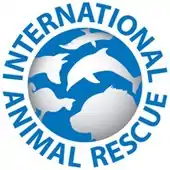 | |
| Type | Charity |
|---|---|
| Industry | Animal welfare |
| Founded | 1989 |
| Headquarters | United Kingdom |
Key people | John Hicks, Alan Knight OBE, CEO |
| Website | www.internationalanimalrescue.org |
International Animal Rescue (IAR) is an animal protection and conservation non-profit organisation that comes to the aid of suffering animals with hands-on rescue and rehabilitation and the protection of wildlife habitats. IAR returns rehabilitated animals to the wild while also providing permanent sanctuary for those that cannot fend for themselves. Its work includes cutting free and caring for captive bears in India and Armenia, rescuing and rehabilitating orangutans and other primates in Indonesia and treating injured and orphaned howler monkeys in Costa Rica. IAR strives to educate the public in the humane treatment of all animals and the preservation of the natural environment. International Animal Rescue has offices in the United Kingdom, United States, India, Indonesia and Malta.
History
International Animal Rescue was established by John and Jo Hicks and first registered as a charity in the United Kingdom in September 1989; in Goa, India in 1998; in the United States in 2001 and in the Netherlands and Indonesia in 2008. IAR Malta became an officially recognised body in 1993.
The first clinic and rescue centre was established in Goa in 1989 to sterilise stray dogs and cats. The Goa centre (known as Animal Tracks) was licensed under the Animal Birth Control (ABC) grant system introduced by Maneka Gandhi.
Patrons
International Animal Rescue's patrons are: Peter Egan, Bill Bailey, Jo Brand, Elkie Brooks, Maneka Gandhi, Dr Scott Miller, Dr Roger A Mugford, Trevor Woodman MBE.
Dancing bear rescue and rehabilitation
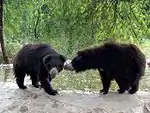
The practice of dancing bears was made illegal in India in 1972 but in the decades that followed sloth bears were still poached from the wild and forced to perform for tourists.
In 2002, International Animal Rescue, together with Indian partner organisation Wildlife SOS, opened the first sanctuary for rescued dancing bears near Agra and the Taj Mahal.
In December 2009, International Animal Rescue and Wildlife SOS succeeded in bringing this cruel practice to an end by rescuing Raju, the last dancing bear in India.[1][2][3][4][5][6][7][8][9]
The rescued bears live in a semi-natural environment in sanctuaries in Agra bear rescue facility,[10][11][12]Agra and Bannerghatta National Park, near Bangalore.
The rehabilitation of the bears' handlers formed an integral part of the project, ensuring they would not revert to bear dancing as a way of earning a living. The Kalandar tribespeople who danced the bears were taught new trades such as rickshaw driving or carpet weaving to help them support their families.
Primate rescue and rehabilitation
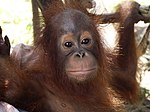
IAR Indonesia grew out of a group called ProAnimalia International that cared for animals confiscated from the illegal trade circuit.
In 2006 ProAnimalia became part of International Animal Rescue and in 2007 a new primate rescue and rehabilitation centre was built in Ciapus, near Bogor, on the island of Java.
IAR Indonesia specialises in rescuing and rehabilitating orangutans, macaques and slow lorises and releasing them back into protected areas in the wild.
In Indonesian Borneo, IAR rescues and cares for critically endangered orangutans at its conservation centre in Ketapang, West Kalimantan, from orphaned infants to fully grown adults that have spent years in captivity. The rescue centre on the island of Java has facilities for the treatment and care of macaques and slow lorises.[13]
Dog welfare
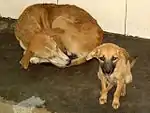
In 1998 International Animal Rescue set up a rescue centre called Animal Tracks in the town of Mapusa in the north of Goa, India, to address the welfare issues of the stray dog population. The sterilisation and vaccination programmes dramatically reduced the numbers of strays and, as a result of the anti-rabies vaccinations, cases of rabies in humans were also eliminated in the areas where IAR operates.
International Animal Rescue's veterinary centre in Trichy, Tamil Nadu was established in 2005 by Dr Deike Schacht. The centre's aim was to control and care for the stray dog population with sterilisation and vaccination, and to provide shelter and treatment for sick and injured dogs.
Cat welfare
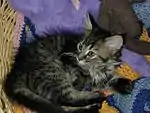
International Animal Rescue's veterinary teams in India and Indonesia routinely sterilise stray cats as a means of reducing and controlling their populations.
Through Catastrophes Cat Rescue, International Animal Rescue gives sanctuary to unwanted cats in the United Kingdom. The cats receive veterinary treatment and are spayed or neutered.
Bird protection
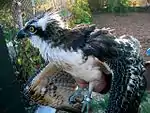
International Animal Rescue joined the campaign to end the illegal shooting of migrating birds in Malta in 1990 and lobbied at a national and European level for greater bird protection while working closely with the police and the Ministry of Environment and Rural Affairs to help animals in need. IAR also provided a 24-hour emergency helpline where inquiries were taken about abandoned animals, illegal bird hunting and trapping, wildlife trafficking and instances of animal cruelty.
For many years International Animal Rescue was involved in the campaign to end illegal hunting in Malta by supporting the work of the wildlife protection unit of the police known as the ALE (Administrative Law Enforcement.) Every spring and autumn IAR would assist the Committee Against Bird Slaughter (CABS) at their bird protection camps. Volunteer bird guards recruited from all over the world and trained by CABS are based in Malta to monitor migration and record any illegal shooting or trapping. A control room is set up and staffed day and night and the police are alerted immediately to any illegal activity so that their patrols can respond swiftly and track down the culprits. Conservationists come from all over Europe and some from further afield to take part in the camps and do their bit to stop the senseless slaughter of thousands of birds every year.
References
- ↑ Nelson, Dean (18 December 2009). "India's last dancing bear saved". The Daily Telegraph. London. Retrieved 22 October 2011.
- ↑ "We saved the dancing bears". Daily and Sunday Express. 22 December 2009. Retrieved 22 October 2011.
- ↑ "Tue, Dec 22, 2009 – Raju, the last of India's long-mistreated dancing bears, finds permanent sanctuary". The Irish Times. 12 December 2009. Retrieved 22 October 2011.
- ↑ "Bear dancing ends in India – Bangalore – DNA". Dnaindia.com. 22 December 2009. Retrieved 22 October 2011.
- ↑ "Raju in, dancing bears do their last act". The Indian Express. India. 21 December 2009. Retrieved 22 October 2011.
- ↑ "News". AlertNet. Retrieved 22 October 2011.
- ↑ "News: Latest stories, exclusives, opinion & analysis - Mirror Online". Archived from the original on 27 May 2010. Retrieved 12 July 2010.
- ↑ "Charity frees 'last' dancing bear". BBC News. 20 December 2009. Retrieved 22 October 2011.
- ↑
- ↑ "Bears". wildlifesos.org. Retrieved 5 October 2020.
- ↑ "Agra Bear Rescue Facility". wildlifesos.org. Retrieved 5 October 2020.
- ↑ Shefali Apte. Lonely Planet Guide To India.
- ↑ David Adam (6 July 2009). "David Adam on the slow loris, the world's only poisonous primate | World news". The Guardian. UK. Retrieved 22 October 2011.